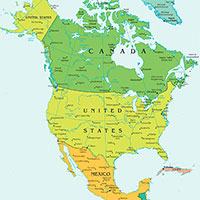Is Canada Ready for the Renewables Revolution?
Perla Hernandez | August 31, 2015.
“The Stone Age didn’t end because we ran out of stones” Sheikh Yamani, Former OPEC Oil Minister.
The oil era will not end because we ran out of oil but because we found more efficient and sustainable energy sources. Canada is going through an existential crisis in terms of its economy and its politics.
Canada’s economy, which has relied on the expansion of the Alberta oil sands since 1967, is now slipping into recession because of low oil prices. Last month the Bank of Canada Governor Stephen Poloz shocked the financial markets with a cut to its key interest rate in order to advert the “unambiguous” effects that low oil prices are having on our economy.
As crude oil prices drop the Canadian dollar depreciates.
The energy sector comprises 10 per cent of the Canadian GDP, and since the collapse in oil prices, which started over a year ago, the Canadian economy has been contracting; ultimately emphasising its over-reliance fossil fuels. While the current economic slowdown can be partly attributed to global economic headwinds like the deceleration in the Chinese economy and the collapse of oil prices, it is mostly the result of the lack of economic diversification.
Over the past decade, the federal government has focused on boosting the oil and gas sector while hammering environmental agencies and weakening environmental laws. Instead of diversifying and supporting other important sectors like manufacturing, which comprises 11 per cent of Canada’s GDP, the federal government has been spending $34 billion dollars on annual subsidies to oil companies. The Canadian economy is underperforming as a consequence.
Canadians are already suffering from the effects of the economic slowdown through increase in unemployment rate, especially among youth, and the increased costs of food and housing. This economic downturn highlights the need for Canada to make the transition from a fossil based economy into a clean renewable economy, which can drive innovation, stimulate the economy and reduce greenhouse gas emissions.
Renewable energy has become a mainstream player in climate change mitigation and adaptation as well as economic development. Perceptions have shifted globally to acknowledge that renewables and energy efficiency can simultaneously address climate change and create new economic opportunities. Advancements in science and technology have lowered the costs of renewable energy production dramatically while progressive policies have promoted investments in some countries.
Recently the Renewable Energy Network for the 21st Century (REN21) published the findings of a 10-year study on the trend of growth of renewable energy worldwide. The Executive Secretary for REN21, Christine Lins, recently commented: “If you look back 10 years ago, Renewable energies were providing three per cent of global energy, and now, they provide something close to 22 per cent, so that has really sky-rocketed”. In 2014 for the first time in 40 years, the global economy grew by three per cent in 2014, while energy carbon emissions stalled, a situation, which is attributed to an increase in efficient renewable technology.
2015 has been a tipping point for increased commitment to reduce carbon emissions and to move into renewable energy.
The G7 countries pledged to decarbonise their economies by the end of the century. This month President Barack Obama announced his clean power plan to move from coal energy to renewable energy and to cut carbon emissions by 32 per cent below 2005 levels by 2030. This has led to high hopes for an ambitious climate agreement to be signed at the UN climate negotiations in Paris later this year.
Even global investors know that the fossil fuel era is coming to an end. This spring HSBC Global Research released a report indicating that climate regulations, low oil prices and innovations in renewable energy could halt fossil fuel extraction.
Even Saudi Arabia, the world’s biggest oil exporter, has embraced the idea that fossil fuels could become irrelevant in the upcoming years.
“We recognise that eventually, one of these days, we are not going to need fossil fuels, I don’t know when, in 2040, 2050…So we have embarked on a program to develop solar energy,” said Saudi Arabia oil minister Ali Al-Naimi to the Business and Climate Conference in Paris last year.
Even though the dawn of the renewables has already started around the world, Canada’s oil dependency has stagnated its transition to clean energy, which could be boosting the economy while reducing emissions and creating secure jobs for Canadians. The clean energy sector in Canada employs roughly 50,000 people in more than 800 firms, and in 2014 the renewable industry grew four times faster than the entire Canadian economy. Despite the potential for renewable energy, the lack of policy support to stimulate economic impetus is holding the sector back. Since 2008 Canada has lost 41 per cent of its global market share in renewables – the third largest loss of any other country.
Increased policy support for climate action and clean technology could accelerate Canada’s transition to a low-carbon economy while still generating economic growth. A report by the World Bank lays out the policy steps for a smooth transition to a zero carbon future by removing fossil subsidies, implementing carbon pricing, and investing in renewable energy. According to a study, Canada’s economy can still grow by 20 per cent over the next decade while reducing greenhouse gas emissions to 25 per cent by 2020 by implementing carbon pricing and cutting fossil subsidies.
The technology for Canada’s transition to a clean economy is available and it is affordable, it is just a matter of political will. With the upcoming federal elections this October, the timing of Canada’s economic downturn is critical. The economy and energy have become central to candidates’ political platforms. Canadians have a chance to elect a new government and to shape the economic and energy policy agenda. It is time for Canada to develop a sustainable, long-term economic strategy that provides stable jobs for Canadians. Growing national grassroots movements, like the “Jobs Justice and Climate”, suggest that Canadians are ready for the renewables revolution.
Photo credit: epSos.de













comment